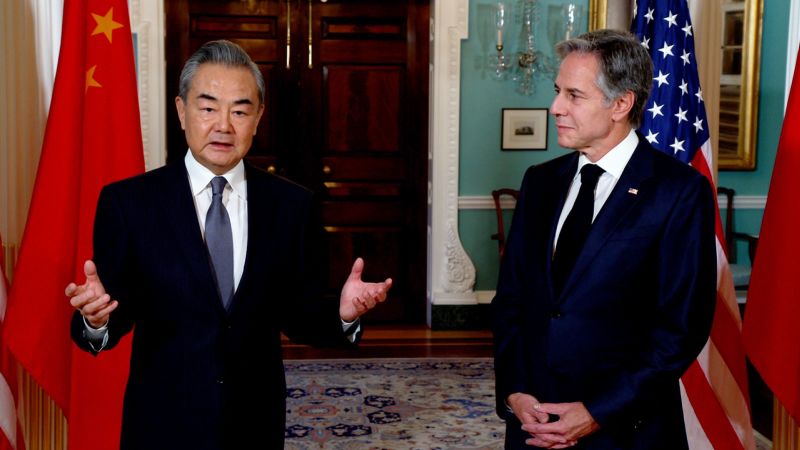US Secretary of State Antony Blinken met with his Chinese counterpart Wang Yi on Thursday with global tensions extremely high as the Israel-Hamas war continues and the US seeks to avoid it spreading to the wider Middle East.
In brief remarks welcoming Wang to the State Department, Blinken said he looked forward to “constructive conversations over the next few days.”
The Biden administration has sought to re-establish normal diplomatic ties with China after an incredibly fraught period, most notably over the Chinese surveillance balloon incident. Blinken and a number of other cabinet officials have traveled to China in recent months.
Wang’s visit to Washington, in which he will also meet with national security adviser Jake Sullivan and speak with President Joe Biden, may lay the groundwork for a potential meeting between Biden and President Xi Jinping at the APEC conference in San Francisco next month.
US officials have said that the two plan to discuss a range of issues in the bilateral relationship, including China’s detention of American citizens like Mark Swidan and Kai Li.
Still, the most pressing focus is expected to be the Israel-Hamas war and preventing a regional conflagration.
Amid his intense multi-country diplomatic mission through the Middle East earlier this month, Blinken spoke with Wang by phone to urge China to use its influence with Tehran to stop the conflict in Israel from expanding. He doubled down on that messaging in remarks on Tuesday at the UN Security Council.
“Members of this council and permanent members in particular have a special responsibility to prevent this conflict from spreading,” Blinken said. “I look forward to continuing to work with my counterpart from the People’s Republic of China to do precisely that when he visits Washington later this week.”
Neither Blinken nor Wang referenced the situation in remarks before their meeting Thursday.
Wang noted that the US and China have “disagreements” and “differences,” but “at the same time we also share important common interests, and we face challenges that we need to respond (to) together.”
He called for “in-depth and comprehensive” dialogue to increase understanding.
“In China-US relations, from time to time, there will be some jarring voices,” Wang said through an interpreter. “When it happens, China treats it calmy because we are of the view that what is right and what is wrong is not to have determined by who has a stronger arm or louder voice, but if one behaves in a way that is consistent with the provisions of the three China-US joint communiques, consistent with international law and basic norms of international relations, and consistent with the climate of the times.”
“We are confident at the end of the day, facts will tell everything, and history will give its fair verdict,” Wang said.
Read the full article here





